 |
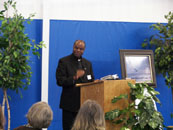 |
 |
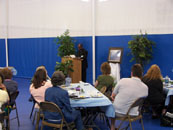 |
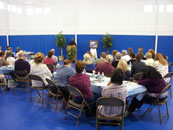 |
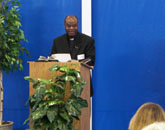 |
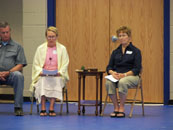 |
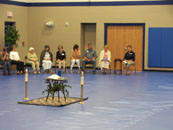 |
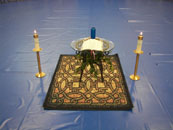 |
 |
 |
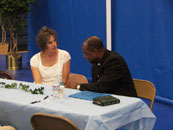 |
This page contains the text of the presentation at the Silent Prayer Retreat in Loveland, Colorado at Saint John the Evangelist Catholic Church. It was presented on June 12, 2008 by Father Mbala. Realize that this presentation is copyright by Father Mbala. Please contact Father Mbala if you wish to use this for any purposes. Free use permission is given for personal and private use only, all other uses are reserved and must be authorized by Father Mbala.
(Click any picture for a better view.)
SILENCE AS THE HEART OF PRAYER
“Be Still and Know that I am God”. Psalm 46, 10
Introduction
I would like to start this retreat by telling you two stories, which are in reality two parables. As you know, a parable is a literary figure of style that consists in telling a truth by using images. I would like to use these two parables as spiritual landmarks that will guide us in the search for silence in our prayer, and will provide us with a frame for my talk. A parable normally uses a symbolic language in order to tell a truth. Given that use, I will first give some explanation in order to help you unveil what is at stake in the story. In the second step, the story will lead us to the importance of silence as major key to our prayer and on how it can open us to the presence of God in our lives. Let us begin with the first story.
I - The Young Boy and the Toad
A mother had a young son she loved so much. Every morning before going to school, the mother would offer him a bowl of milk and slices of bread for his breakfast. In order to enjoy the breeze of early morning and to savor joyfully his breakfast, the young boy often went out of the house and sat in the garden on a table that was used for familial gatherings and celebrations. It was only after having enjoyed the breakfast in the delightful atmosphere of the morning in the garden that he could go to school. It was like that every day that God had created.
One day, as it was his custom, he went out and sat on the table in the garden to enjoy his breakfast in the early morning. As he was eating, he saw a toad coming toward him on the grass, very likely attracted by the smell of the breakfast. Surprised by this unexpected visit, the young boy did not know what to do with the small beast.
Suddenly, an idea came to his mind: “What about giving him a little bit of my bread”, he said to himself, “Perhaps the toad is hungry and would like to have something to eat”. As to link an act to the idea, he took a peace of bread of what was part of his breakfast and threw it to the small beast. The toad did not eat it at all, but rather it did not stop looking at him.
Then, a conversation began between the boy and the small beast. “Why don’t you eat the bread I give you if you are hungry? That’s all I have and I can give you. – The small beast reacted, “No, that’s not all that you have. I’m not interested in your bread”.
By this answer, the boy understood that the presence of the toad at his table had something to do with the milk he had in his bowl. He, then, put the bowl of milk on the ground. In a firm and sudden movement of his whole being, the small beast jumped in the bowl and sucked up the whole milk. After having his full of it, the small beast left, happy for having found what he was looking for.
This action happened every day in the garden any time the young boy came out and sat in the garden to eat his breakfast. Because it happened every day, it had become for him like a routine, but a wonderful routine that delighted him a lot. The idea of being able to feed a small beast attracted by the milk that nobody among humans would dare give to the toad gave the young boy a profound joy. It was as though he had discovered a treasure whose secret was known to him alone. The friendship that was born from this daily meeting with the small beast made him the happiest among the teens of his age.
Furthermore, the scene which had become to him like a ritual made a lot of difference in his life. Every day, he was happy, comfortable and at ease with himself, his parents and with his classmates in school. His studies in the school were so brilliant that everybody was wondering about the secret of such a success. Even his parents could not understand or know why their child had become so different to the point that his happiness was far greater than that of other kids from the neighborhood.
One day, while the young boy was in the garden taking his breakfast as was his custom, the mother heard a strange noise outside from the garden. That was truly strange to her, because she knew that her son was alone in the garden and not with someone. Afraid that a stranger had intruded in the garden to harm her son, she jumped out of the house like thunder. At her surprise, there was nobody in the garden but her son.
However, she realized that her son, instead of being quiet, was talking to a strange creature, leaning on his table in the direction of the grass. In fact, her son was talking to a toad. What a stranger thing than that! She was out of herself and could not understand how her son could talk to such a strange beast. In an instinctive movement of her being, she just jumped on a piece of wood that was lying on the grass of the garden and, without any hesitation, killed the small beast.
From that day on, everything changed for the young boy. From the happiest he was before, he became a sad and morose boy. His world that made him happy had just scrambled with the killing of the toad. He wept the whole day long with sadness, refusing to eat and to be consoled. He lost interest in any activity he did before with enthusiasm. He became locked up in himself, refusing to talk and to play as he did before. Everything was dying around him; the killing of the toad had killed in him any desire to live. What does this story mean?
Explanation of the Story:
The young boy in the story represents human beings in the world. As such, the young boy represents each one of us in the variety of our activities and vocations in the world.
In fact, there are many things we enjoy doing in our life and which bring us satisfaction and contentment. None of us can say that he/she has never been happy in his life in the many activities and services we perform in the world.
In spite of all that, we know, however, that our happiness is fragile. It can be easily frightened by dissatisfaction, disappointment, crisis, illness and death. The secret of true happiness is in God, and is God. The young boy has found the secret of his happiness in his withdrawal in the garden where he could draw the strength to deal with the problems of life from his friendship with the toad.
The toad represents God. The small beast may appear to some not beautiful to see, to others a little bit strange to be acquainted with, and to some others again as a dangerous animal to be approached, but to those who have discovered the secret of their happiness, it is all they need in order to keep going on with life and enjoy it. The young boy had found the secret of his joy in his association with the toad. Every morning he was able to withdraw in the garden, in silence, to enjoy his breakfast in the presence of this mysterious friend.
By feeding the mysterious friend, it was him, in fact, who, in the end, was fed and empowered. So, he could start his day with peace of heart and joy.
As it appears, the point of the parable is to tell us that it matters if we have found the secret of our happiness or not. It really makes a difference in life when a day is started in the presence of the Lord, in meditation and prayer. When we make such a discovery, there is nothing else we can do than to maintain the contact with the Lord and nourish it as much as possible.
It does not mean that all the problems of life are resolved once and for all, because we have become close to the Lord. The truth is that, in spite of all that life can represent in terms of hardships and trials, we are more aware of the presence of the Lord in our life than ever; we are aware that we are never alone. The Lord is with us in all the vicissitudes of our life.
Most of us certainly believe in God, but how often are we aware of his presence? How often do we make ourselves present to him? How often are we open to his presence in our lives? When God is removed from our life for any reason or another, at the end it is we who are the losers. In fact, we lose an important source of our joy and happiness. God is in our life like what the sun is to the mechanism of the universe, providing the light necessary for the maintenance of life on earth for the plants, various animals and human beings. When we remove God from our life, the worst can happen to us. That is what happened to the young boy.
As Jesus says, in the Gospel of John, “Without me, you can do nothing” (John 15, 5-6). When we cut off our relationship with the Lord, we end up by losing the direction of our life. But, it means also that if we want to maintain that relationship, we have to nourish it. In order to do so, beside the meditation of the word or the practice of the sacraments, is the silent prayer. How do we come to the silent prayer?
Looking into the Tradition of the Church
We certainly all know that God is important for our life, that it is our duty as Christians to worship him as he recommends us. But, we have to acknowledge also that our relationship with the Lord is not as perfect as it should be. I am not talking here about our sinful nature, which is another reality, but of the fact that sometimes we are not aware of this relationship; we live it unconsciously. Our society has made us hyperactive people, caught up in multiple commitments and numerous activities in society. We are so busy with activities that our worship of God becomes a matter of Sunday mass and sporadic practice of our devotions. And yet, we need not only to be aware of the presence of the Lord in our life, but also to make ourselves open to that presence.
That is why it is important to build a secret garden where we can in silence encounter God, listen to him talking to us, and receive direction for our lives. This is not something new; it is part of the tradition of the Church. All the saints were men and women of prayer. The problem for us is not of becoming nuns or monks, but of finding a balance between our activities and this imperative of silent meeting with the Lord so vital to our spiritual growth.
The tradition of the Church is rich with a collection of prayers, devotions, and spiritual practices that make up the posturing of ourselves before God. These exercises are “keys” that open us to greater intimacy with God. Although these spiritual exercises are important, they are not, however, as important as the relationship to which they open. We need to look beyond the prayers we say and devotions we attend. If we stay within these formal exercises, there is a danger we will become mere maintenance persons.
A best example we can give is that of maintenance workers in a school. In fact, the maintenance workers can open all the doors of the building, they can open all the classroom doors, but they never go in to take the courses that are offered. Although, they are in the school, they are nevertheless out of what the school is offering.
When we apply all that to our spiritual life, it means that we have to be more involved in what we do as prayer, but this is impossible without our awareness of God’s presence in the act of prayer. One way of helping in this task is the silent prayer. The silent prayer does not replace the ordinary ways of praying or different devotions we have in the Church, it only adds some dimension to what we already have and know.
In the tradition of the Church, there are two approaches to prayer. The first approach is what is called kataphatic. The word kataphatic is from the Greek word kata meaning “down”, and phasis which means speech. So the kataphatic tradition speaks of divinity in the only way we know how, by “talking down” in the sense of using our knowledge, words, images, and senses. Kataphatic prayer is, therefore, a prayer made up with words, concepts, images, and resolutions. We pray, we pay attention to what we pray, we examine our conscience, we resolve to do better, we acknowledge our faults, and then we go out and try to live what we pray.
An example of kataphatic prayer is what we call Lection divina. Lection divina which means literarily “divine reading” is the meditation of the word of God from which we raise our prayer to God. We read the word of God, we reflect on it, and respond to God in terms of resolutions for our relationship with him. For instance, after having read the word of God or listened to it, I ask myself: What has touched my life in this reading? What might God be inviting me to do? What can I do in order to put my life in line with the invitation of God? From all that we have meditated, we take some resolutions for the future, and so on.
The second approach is what is called apophatic. The Greek word apophani means to mention something by saying what an object is not. The apophatic tradition tends to be speechless, to be wordless. It senses that speech is helpless to describe God as the eyes are at looking into the sun. This is the approach of surrendering to the infinite, of losing one’s center in order to find it in God. This is the approach of paradox, verbal modesty, and finally silence. This is the approach of surrender, of receptivity on the deepest level.
The apophatic tradition is the way of negation which emphasizes the radical differences that exist between God and us. God is best reached by forgetting, by unknowing, without support of concepts, images, or symbols. The apophatic approach can be best represented by the contemplative outreach and in a modest way by what is called the Centering prayer.
In the apophatic tradition, our understanding in this way emphasizes the difference between us and God. No matter what example I use, my words cannot really capture who and what God is. My finite faculties can never grasp God with my intellect. I finally admit that I am finite and God is infinite and in the end all I can do is rest in God’s presence, be in God’s presence, surrender to God – God who is beyond all speculations. We know what God is not, more than what God is. Our mind becomes dark, without the support of images, concepts, or symbols. A best illustration of such approach can be found in the writings of St John of the Cross and of many mystics.
Examples from the Scriptures
Let us give some examples by referring to the Scriptures. The first example is that of the prophet Elijah (1 Kings Elijah 19, 9-13). The context of this text is important to help us understand what happened to Elijah. In fact, the king of Israel, Ahab, has married a foreigner queen, Jezebel. Through the instigations of the queen, the king and his people have abandoned the adoration of the true God and embraced foreigner gods. In revenge, God punished them through the prophecy of Elijah with a drought of three years. Meanwhile, Elijah has had the prophets of Baal, the foreigner god, executed, at the great discontentment of Jezebel. As a consequence, Jezebel wanted to have him killed. It was at that time that the prophet fled the country to find a refuge in the desert. There, the Lord invited the prophet at the cave of the mountain where he had to meet him and talk to him.
Suddenly a strong and heavy wind was rendering the mountains and crashing the rocks everywhere, at that time the prophet thought that the Lord was there, but the Lord was not in the wind. After the wind, there was an earthquake that shook everything all around, the prophet thought that the Lord was there, but the Lord was not in the earthquake. Then, a blazing fire came up like in the time of Moses at the blazing bush, but the Lord was not in the fire. Finally, a silent breeze came up with a sound whispering. When the breeze came up, Elijah recognized the presence of the Lord and covered his heard. Then, the Lord talked to him and sent him to anoint another king for Israel.
Another example is that of Job (Job 40, 3-5). The story of Job is certainly well known to most of us. He was rich and successful in his family and his business. He had earned all his possessions through hard work and righteousness. He was what the American people call a very successful man. Suddenly, a misfortune struck him to the point of losing everything he possessed, including his own children.
For his friends, that was an obvious sign that he had sinned grievously against God, because it made no sense to them that God could punish someone to such a point if he was not a sinner. But Job knew in his heart that he did not do anything wrong. He had been always faithful to God and to his commandments. Because of that, he undertook a discussion and engaged in arguments with God about his misfortune.
In the heat of the discussion, God reminds him that he has no lesson to receive from him, because he has created everything that exists with wisdom and order, and guides it with his providence. Who was he, Job, to contradict God’s plan? Once Job realized how mistaken he was to discuss with God, he came just to silence before him:
“Then Job answered the Lord and said: Behold, I am of little account; what can I answer you? I put my hand over my mouth. Though I have spoken once, I will not do so again; though twice, I will do so no more”.
These words of Job echo the sense of what silent prayer means. It is in silence that we can listen to the Lord the best. In silence, we make ourselves aware of the presence of the Lord as we let ourselves be open to his presence. The Lord speaks to us in silence, and to the silence of our hearts.
II - The Parable of the lost Key
There was in the Tibet region, in China, an old Buddhist monastery situated up the mountains. In that monastery lived a Guru who was very loved and respected. Because of his age and the experience he had accumulated over the years, and the fact that he was the oldest, he was almost a Master to all the monks in that monastery.
One day, the guru lost the key to his house and was looking for it in the grass outside. He got down on his hands and knees and started running his fingers through every blade of grass without any success.
After having struggled many hours in the grass without finding his key, ten of his disciples came to his rescue. They said, “Master, what is wrong? Why are you in sweat in the grass under the sun?”
- He said, “I have lost the key to my
house”.
- They said, “Can we help you find it?”
- He said, “I’d be delighted”.
So they all got down on their hands and
knees and started running their fingers through the grass in order to find the
key.
As the sun grew hotter, one of the more intelligent disciples said, “Master,
have you any idea where you might have lost the key?”
The Master replied, “Of course. I lost it in the house.”
To which they all exclaimed, “Then why are we looking for it out here?”
He said, “Isn’t it obvious? There is more light here”.
Explanation of the Story:
We have all lost the key to the house. We do not live there anymore. We do not experience the divine indwelling. We do not live with the kind of intimacy with God that Adam and Eve reportedly enjoyed in the Garden of Eden and the Buddhist Master seems to have enjoyed before he lost his key.
The house in the parable represents happiness and happiness is intimacy with God, the experience of God’s loving presence. Without that experience, nothing else quite works; with it, almost anything works.
Many people live in the world without the true source of happiness, which is the experience of the presence of God. They have lost the key to happiness. Even for most of us who are Christians, we have a problem to come to the enjoyment of God’s presence. What we experience is our desperate search for happiness where it cannot possibly be found. The key is not in the grass; it was not lost outside ourselves. It was lost inside ourselves. That is where we need to look for it.
Each one of us is looking for this key and nobody knows where to find it. If you want help as you look for the wrong place, you can get plenty of it, because everybody is looking for it in the wrong place, too: where there is more light, pleasure, security, power, acceptance by others. We have a sense of solidarity without any possibility of finding what we are looking for.
Listening to Jesus’ Wisdom
At the beginning of Jesus’ ministry, there are these powerful words he addresses to his listeners: “This is the time of fulfillment. The kingdom of God is at hand. Repent and believe in the Gospel” (Mk 1, 15). What interests me in this verse is the word “Repent”. When Jesus said, “Repent,” to his first disciples as well as to his followers, he was calling them to change the direction in which they were looking for happiness. “Repent” is an invitation to grow up and become a fully mature human being, openness to the experience of God’s presence, which restores the sense of happiness.
But, how can we come to the experience of God’s presence? It is through prayer that we can enter into contact with God and enjoy his presence. Listen then what Jesus says about prayer in his program speech we usually call “the Sermon on the mountain”:
When you pray, go to your inner room, close the door, and pray to your Father in secret. And your Father who sees in secret will repay you (Mt 6, 6).
To whom do we pray? It is clear, according to the word of Jesus, that the one to who we address in our prayer is a Father. Father in the understanding of the Old Testament means the one who is the ground of everything that exists. The word “Father” in Aramaic means Abba, in English Daddy.
The use of the word, Abba, shows in the mind of Jesus that God is not first of all the God of armies, the utterly transcendent God, remote, the rewarder of good and the punisher of evil, available only at sacred times and places.
Such a concept of God is still relevant among many Christians. They often see God is terms of punishment. That is why they live in fear to the point that what they do in their Christian duties is accomplished more through, and commanded by fear than by God’s love. As I say this, I remember one day after I had said in a homily that the last word of God is not punishment, but rather mercy, a lady came to me after the mass and just threw it to me in the face, “that’s Baptist” and not catholic. Unfortunately, she did not give the time to respond and walked away.
Jesus’ use of the term “Abba” wants to tell us that God is primarily the God of infinite mercy, whose power is in the service of divine love and whose infinite transcendence is equaled by his infinite immanence. This is the God whom we encounter in our prayer.
If so, the first attitude of prayer when we go to pray in secret is confidence. God, Abba, is close, concerned, nurturing, bending over us with boundless protection, tenderness and love. These are the convictions to cultivate in order to enter with confidence in the “inner room”. If there is anything we can do at this point is to purify our representation of God. Our representation of God can block our relationship with God or open it to promising perspectives.
Prayer as Relationship with God
Another thing I have to say is that prayer is above all a relationship. Jesus says, “When you pray…”, but what does prayer mean? Prayer is first of all a relationship we establish with God. Whatever one does by way of prayer, ritual, or service toward others, it is essential that one’s actions come from a relationship with God characterized by trust and love.
We hear a lot about fear in the scriptures in both the Old and the New Testament. “Fear” is a technical term in Scripture and does not normally mean feeling of fear. It is best translated as reverence, awe, or wonder. An even more accurate rendering might be “the continuous awareness of God’s presence”. To be always aware of God is to take refuge in God’s protection at all times. The last thing the term “fear” implies is to look upon God as dangerous. Like the idea that we are unworthy of God’s love, the feeling of fear in relation to God must be firmly put aside when we enter into prayer.
If prayer is understood in such terms, the key word is friendship with God, a conversation with God in which one can be at ease and converse with God any time, in any place, and in one’s words. It will eventually lead to committing oneself and one’s whole life to God and opening oneself to the transformative process of divine union.
Prayer, whatever form it may take, is thus an expression of one’s habitual relationship with God. Its translation into prayerful action is dependent on that relationship. The divine invitation might be stated in this way: “If you would like to access the deeper knowledge of God and enter into the process that leads to divine union, then enter your inner room as first step.”
First Step: Going in the Inner Room
What does inner room mean? The inner room designates a spiritual space rather than a physical location. It is the symbol of the deepest level of our spiritual being. In that sense, it is an interior disposition of openness and surrender to God. That is how all the Fathers and the Mothers of the desert have understood. It means letting go of the ordinary psychological awareness of everyday life with its tumult, noise, worries, and the various commentaries that go on in our heads about people, events, and our emotional reactions to them. This intuitive level is inclined to silence. It is closer to the innermost center of our being which is the true Self, and to the Trinity, the source of our being at every level, body, soul and spirit.
When we are locked into our ordinary psychological awareness, we are dominated by our experiences – events and people entering and leaving our lives and our emotional reactions to them – and we cannot respond fully to reality or evaluate it objectively. Moreover, we are constantly influenced by the values of the culture in which we live, and by what people think of us or don’t think of us. The tyranny of over-identification with what is going on at the surface of our awareness prevents us from experiencing the intuitive level that, of its very nature, tends to be more peaceful, calm, and open to the presence and guidance of the Divine Indwelling.
Jesus’ suggestion of the inner room implies letting go of the stimulation that comes through the senses, memory, imagination and faculties, and to treat them all with complete disregard. In other words, we are not to engage with thoughts of any kind during the time of prayer. In centering prayer, for instance, when we notice we are engaged with thoughts of any kind, we return ever so gently to the Sacred Word.
Second Step: Closing the Door
Jesus’ recommendation obviously requires a choice. It means that, at least in our will, we let go of ordinary, everyday awareness for the whole time of prayer period. If thoughts keep coming down the stream of consciousness, we do not get disturbed, but simply disregard them. At the beginning, it can be difficult, but a little bit of practice of silent prayer, we can surely dismantle them.
We need to be aware of the fact that most of the time, our thoughts and perception are a response to our instinctual needs for survival and security, affection and esteem, and power and control. We put a lot of our energy in the gratification of these emotional programs. It does not mean these are wrong, rather they are necessary for our survival in early childhood. Our mistake, however, is to invest them with exaggerated expectations and to seek happiness through the gratification of these childish programs in adult life where they cannot possibly work. But when the satisfaction of these instinctual needs diminishes, we have more energy for the spiritual journey and for the service of others. Silence here becomes very important. It is a threshold to the door of God.
The Interior Dialogue
To close the door to the inner room is an invitation to discontinue our interior dialogue. That means not to think about the things we are perceiving through the senses or reflecting upon with our rational apparatus. In practice, we stop harboring expectations or goals for our period prayer. In practice, whenever in Centering Prayer we have a particular thought that engages our attention, we reaffirm our original intention of closing the door by returning ever gently to the sacred word.
What does interior dialogue mean? It is that discussion we have with ourselves that goes on continuously twenty-four hours a day, in which we evaluate and comment on what is happening with regard to events, people entering and leaving our lives and emotional reactions to them. This endless stream of commentaries, judgments, and desires can be more disruptive to interior silence than ordinary level of awareness that we chose to leave behind when we begin our prayer.
Given that we have long-established and deep-rooted habits of thinking and reacting from early childhood, we have to be patient with ourselves in trying to moderate our reflective apparatus with the tendency to think about anything that comes to mind. The humble acceptance of our weakness is one of the principal disciplines of Centering Prayer. It is at the same time a relationship of boundless confidence in God. We believe that God is already present. Hence, there is no place to go to find him and no need to run away from ourselves.
The Third Step
Finally, Jesus says: “Pray to your Father in secret”. The invitation of Jesus is to go to deeper levels of interior silence. In this process, we let go of external stimuli. Then, we relinquish the interior dialogue with ourselves. Finally, we enter the stillness of prayer in secret. This kind of silence is silence of the self. “Perfect Prayer”, according to St Anthony the Great “is not to know you are praying” it is to forget self and to let go for the whole period time of the prayer of all self-reflection including, so far as possible, self-consciousness itself.
If we are to access the God who sees in secret and is in secret, we have to enter into the same kind of secrecy. God is so close that we do not have any faculty to interpret the divine presence. Only pure faith beyond thoughts, feelings, and reflections can access it.
The inner room gives us a chance to take a vacation from ourselves. There is nothing so relaxing. When we acquaint to such prayer, our energy instead of being wasted on trivia, will become available to respond to the needs of others and the liberation of all that is creative in our own natural endowment.
Example type of Silent Prayer: Centering Prayer
As I said before, prayer is a relationship with God. It is not just a communication of words; it is a communication between two beings, one finite and the other infinite. In any relationship, there are different levels, acquaintance, friendliness, friendship, and union. The best example we can give is that of the elderly couple. In the life of an elderly couple, there comes a time where they have nothing to say to each other, but sit just in silence one against the other, enjoying each other’s presence. That is exactly what Centering Prayer is proposing.
Before entering deeper into in this subject, let us talk about obstacles to the union with God in prayer. There three major obstacles that prevent our union with God: Over-conceptualization, Hyperactivity and Overdependence on Self.
Over-conceptualization is always trying to figure things out to the point that thinking becomes the centerpiece of our lives. There is nothing wrong with thinking and putting things in some reasonable framework. But, if we are not able to let go of our thoughts at times, how can God put another thought in our minds? How would God give us new information when we are always concerned with our own thinking and thoughts?
Hyperactivity is willing always to do something; never taking the time to stop. It is true that we have responsibilities that need to be taken care of. Yes, there are times when we are the only ones who can do it. But, is it true all the times? I do not think so. After a while our activities run our lives rather than the opposite. If we cannot learn to stop what we do, how will God teach us new activities? How will God make an appointment with us if we are always booked up?
Overdependence on self is acting as though everything depends on us. A French saying says, “Aide-toi, le ciel t’aidera”, meaning, “God helps only those who help themselves”. However, that is not always true. God helps also those who do not help themselves. It is true that we have to be accountable and responsible for our life. But, how can God get through to us if there is no space or even the realization that we are dependent on God?
The Process of Centering Prayer
Centering Prayer is a way, and a method, of developing our relationship and union with God. The heart and soul of Centering Prayer is the consenting to God’s presence and action in our lives. It is in coming apart with the Lord to rest so that the Lord may minister to us.
Centering Prayer, besides being a communion with God, helps to prepare us to hear the word of God on a much deeper level. By letting go of the thinking, the activity, the need to do everything ourselves, there is a preparation to be more open to God’s presence within. Through centering prayer we offer our intention to consent to God’s presence and action within, while we let go of everything else except our intention.
Guidelines in the Process of Centering Prayer:
The choice of the Sacred Word. The sacred
word is a word we choose as a symbol of our intention to consent to God’s
presence and action within. The best example is that of Blessed Mary saying to
the angel, “Be it done unto me according to your word”. The sacred word is the
saying of “Yes, I do” to the Lord.
There are many ways of choosing the sacred word. You pray to the Holy Spirit
to help you in your choice. When you are in intimate conversation with God,
what is the name you call him? What is your favorite name you give to God?
Following this inquiry, you might find a list of proposals; Father, Mother,
Abba, God, Love, Jesus, Christ, Yahweh, Brother, savior, Spirit, lover,
Shalom, etc…
The second step is the position to take
in prayer. It is required to sit comfortably and with eyes closed. Settle
briefly and silently introduce the sacred word as the symbol of your consent
to God’s presence and action within. Sitting comfortable means for the most
part with the back straight and upright. Comfort during prayer is important
because we are offering our bodies to the Lord; they are the temple of the
Holy Spirit. We honor that by preparing our bodies for our time of prayer
We close our eyes to let go of visual contact with the world around us, pause
a moment, and begin to pray our sacred word. The praying of the word is gently
repeated when needed to renew our intention, our “I do” to the Lord in the
spirit of Jesus praying to his Father.
When you become aware of thoughts, return
gently to the sacred word. Notice carefully that phrase, “When you become
aware”. If there are times when you are not aware of anything because you are
in silence, then there is no reason to pray the sacred word.
The term thoughts is an umbrella term covering any perception like feelings,
images, memories, reflections, and commentaries. We have to realize that
thoughts are normal and part of our life and part of centering prayer. What is
required is not to suppress them, but to let them come and go like a boat on a
sea that keeps going without being stopped by the waves on the surface of the
sea. To let the thoughts come and go is called in spirituality the detachment
or holy indifference. This guideline is very important as the basis of letting
go and also dying to oneself.
At the end of the period of prayer, remain in silence with closed eyes for a couple of minutes. Why do so? So that the reservoir of silence that has built up in you can be carried into the activities of the day. Silence is a powerful healer and sustainer. It helps give us a peaceful center so that when we return to the busy routine we can find ourselves responding to the events of our lives, rather than just reacting to them. Note that the recommended time of prayer is 20 minutes and two times a day.
Conclusion
Prayer is to enter a relationship with God; it is a communication between God and us. It is a communion of two hearts in conversation. We do not communicate only with words, but also with our presence, with empty hands. We should not underestimate the power of our presence in prayer. Prayer is not our performing for God; it is our being with God. Centering prayer is a method and discipline. It prepares for a deepening of faith that moves beyond thoughts and concepts. We need just to listens to God, to be open and receptive to the divine presence in our inmost being. We listen not with a view to hearing something, but with a view to becoming aware of the obstacles to our friendship and union with God.
Bibliography
Thomas Keating, - The Human Condition.
Contemplation and Transformation
- Manifesting God
- The Kingdom of God is like…
- Intimacy with God
Carl Arico, A Taste of Silence. A Guide to the Fundamentals of Centering Prayer
Loveland, June 12, 2008
Felicien I. Mbala, PhD, STD

Home The Word Church Homily Pictures Travels Contact Me Who is Links Thoughts
|
©2006-11 Father Felicien Mbala |
|
Hits beginning April 8, 2011